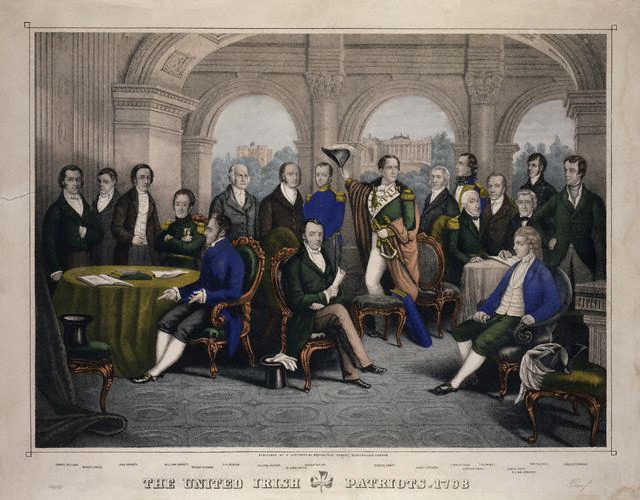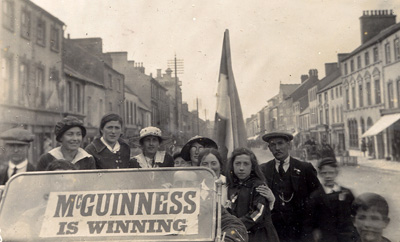|
Leonard MacNally
Leonard McNally or MacNally (27 September 1752 – 13 February 1820) was an Irish barrister, playwright, lyricist, founding member of the United Irishmen and spy for the British Government within Irish republican circles. He was a successful lawyer in late 18th and early 19th century Dublin, and wrote a law book that was crucial in the development of the "beyond reasonable doubt" standard in criminal trials. However, during his time, he was best known for his popular comic operas and plays, together with his most enduring work, the romantic song " The Lass of Richmond Hill". He is now mainly remembered as a very important informer for the British government within the Irish revolutionary society, the United Irishmen and played a major role in the defeat of the Irish Rebellion of 1798. In return for payments from the government, McNally would betray his United Irishmen colleagues to the authorities and then, as defence counsel at their trial, secretly collaborate with the prosecu ... [...More Info...] [...Related Items...] OR: [Wikipedia] [Google] [Baidu] |
Dublin
Dublin is the capital and largest city of Republic of Ireland, Ireland. Situated on Dublin Bay at the mouth of the River Liffey, it is in the Provinces of Ireland, province of Leinster, and is bordered on the south by the Dublin Mountains, part of the Wicklow Mountains range. Dublin is the largest city by population on the island of Ireland; at the 2022 census of Ireland, 2022 census, the city council area had a population of 592,713, while the city including suburbs had a population of 1,263,219, County Dublin had a population of 1,501,500. Various definitions of a metropolitan Greater Dublin Area exist. A settlement was established in the area by the Gaels during or before the 7th century, followed by the Vikings. As the Kingdom of Dublin grew, it became Ireland's principal settlement by the 12th century Anglo-Norman invasion of Ireland. The city expanded rapidly from the 17th century and was briefly the second largest in the British Empire and sixth largest in Western Europ ... [...More Info...] [...Related Items...] OR: [Wikipedia] [Google] [Baidu] |
Call To The Bar
The call to the bar is a legal term of art in most common law jurisdictions where persons must be qualified to be allowed to argue in court on behalf of another party and are then said to have been "called to the bar" or to have received "call to the bar". "The bar" is now used as a collective noun for barristers, but literally referred to the wooden barrier in old courtrooms, which separated the often crowded public area at the rear from the space near the judges reserved for those having business with the court. Barristers would sit or stand immediately behind it, facing the judge, and could use it as a table for their briefs. Like many other common law terms, the term originated in England in the Middle Ages, and the ''call to the bar'' refers to the summons issued to one found fit to speak at the "bar" of the royal courts. In time, English judges allowed only legally qualified men to address them on the law and later delegated the qualification and admission of barristers ... [...More Info...] [...Related Items...] OR: [Wikipedia] [Google] [Baidu] |
Microcosm Of London Plate 089 - Vauxhall Garden Edited
Microcosm or macrocosm, also spelled mikrokosmos or makrokosmos, may refer to: Philosophy * Microcosm–macrocosm analogy, the view according to which there is a structural similarity between the human being and the cosmos Music * ''Macrocosm'' (album), seventh studio album by the German electronic composer Peter Frohmader, released in 1990 * ''Makrokosmos'', a series of four volumes of pieces for piano by American composer George Crumb * "Mic-rocosm", a song by American rapper Prodigy from the album ''Hegelian Dialectic'' * ''Microcosm'' (album), 2010 album by Flow * ''Microcosmos'' (Drudkh album) * ''Microcosmos'' (Thy Catafalque album) * ''Mikrokosmos'' (Bartók), a cycle of piano pieces written 1926-1939 by Hungarian composer Béla Bartók * ''Mikrokosmos'' (Turovsky), four cycles of lute pieces, ''Mikrokosmos I-IV'', by Ukrainian-American composer Roman Turovsky * ''Mikrokosmos'', pseudonym used by former Dark Star frontman Christian Hayes for solo material * ''Mikrokos ... [...More Info...] [...Related Items...] OR: [Wikipedia] [Google] [Baidu] |
An Phoblacht
''An Phoblacht'' (Irish pronunciation: ; ) is a Sinn Féin-affiliated online Irish republicanism, Irish republican news platform which also publishes a quarterly print magazine format. Editorially the paper takes a Left-wing politics, left-wing position and was supportive of the Northern Ireland peace process. Along with covering Irish political and trade union issues the newspaper frequently featured interviews with celebrities, musicians, artists, intellectuals and international activists. History Earlier publications The original ''An Phoblacht'' was founded as the official organ of the Dungannon Clubs in Belfast in 1906 and its first edition was printed on 13 December 1906 under the English-language version of the title ''The Republic''. In the first edition, Bulmer Hobson, one of the founders of the Dungannon Clubs, set out their aims: A year later the paper merged with a Dublin publication called ''The Peasant''. However, the title ''An Phoblacht'' was again used fro ... [...More Info...] [...Related Items...] OR: [Wikipedia] [Google] [Baidu] |
Sinn Féin
Sinn Féin ( ; ; ) is an Irish republican and democratic socialist political party active in both the Republic of Ireland and Northern Ireland. The History of Sinn Féin, original Sinn Féin organisation was founded in 1905 by Arthur Griffith. Its members founded the revolutionary Irish Republic and its parliament, the First Dáil, and many of them were active in the Irish War of Independence, during which the party was associated with the Irish Republican Army (1919–1922). The party split before the Irish Civil War and again in its aftermath, giving rise to the two traditionally dominant parties of Irish politics: Fianna Fáil, and Cumann na nGaedheal (which merged with smaller groups to form Fine Gael). For several decades the remaining Sinn Féin organisation was small and often without parliamentary representation. It continued its association with the Irish Republican Army (1922–1969), Irish Republican Army. Another split in 1970 at the start of the Troubles led to th ... [...More Info...] [...Related Items...] OR: [Wikipedia] [Google] [Baidu] |
Robert Emmet - Trial
The name Robert is an ancient Germanic given name, from Proto-Germanic "fame" and "bright" (''Hrōþiberhtaz''). Compare Old Dutch ''Robrecht'' and Old High German ''Hrodebert'' (a compound of '' Hruod'' () "fame, glory, honour, praise, renown, godlike" and ''berht'' "bright, light, shining"). It is the second most frequently used given name of ancient Germanic origin.Reaney & Wilson, 1997. ''Dictionary of English Surnames''. Oxford University Press. It is also in use as a surname. Another commonly used form of the name is Rupert. After becoming widely used in Continental Europe, the name entered England in its Old French form ''Robert'', where an Old English cognate form (''Hrēodbēorht'', ''Hrodberht'', ''Hrēodbēorð'', ''Hrœdbœrð'', ''Hrœdberð'', ''Hrōðberχtŕ'') had existed before the Norman Conquest. The feminine version is Roberta. The Italian, Portuguese, and Spanish form is Roberto. Robert is also a common name in many Germanic languages, including Engl ... [...More Info...] [...Related Items...] OR: [Wikipedia] [Google] [Baidu] |


